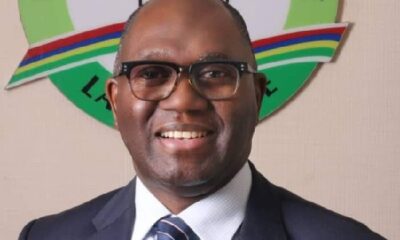Sanwo-Olu expresses commitment to fulfilling promises to Lagosians, says COVID-19 won’t be an excuse
Lagos State Governor, Mr. Babajide Sanwo-Olu on Monday assured Lagosians that his administration is committed to fulfilling all his promises despite disruption occasioned by the COVID-19 pandemic and other challenges that were not envisaged.
The Governor said fulfilling the promises in line with the T.H.E.M.E.S development agenda for ‘Greater Lagos’ would be delivered by the incumbent administration, despite reduction in the budget as a result of the COVID-19 pandemic, knowing fully that no excuse will be tenable to the residents of the State.
Speaking during the opening ceremony of the first Lagos State two-day Ministerial Performance Review retreat being held at the Adeyemi Bero Auditorium, Alausa on Monday, Governor Sanwo-Olu said the State Government is determined to step up the tempo of governance through innovative and inclusive policies.
He said: “I want to assure you that despite disruption occasioned by COVID-19 and other challenges that we did not envisage, we are still committed as a government to fulfilling the promises we made to people knowing fully that no excuse will be tenable to our citizens.
“We must be determined to step forward, heighten the tempo of governance and continue to create opportunities through innovative policies that are not only inclusive but provide sustainable solutions for this present administration and lay foundation for future administrations coming behind us.”
Governor Sanwo-Olu also implored members of the state executive council and other public office holders to be committed to the incumbent administration’s effort to meet the yearnings and aspirations of Lagosians, especially the electorates who elected him to govern the affairs of the state.
He said: “Let me emphasise that our yardstick for performance assessment will not be based majorly on the amount of money expended or Budget but the outcome of our various interventions that we have had; what measures the impact that touched the lives of citizens that we swore to serve.
“One of the promises we made at the inception of our administration and in line with the principle of continuity was to ensure the completion of projects that were inherited from the last administration. A significant part of our efforts and resources was devoted towards fulfilling this promise and taking government to another level.”
The Deputy Governor, Dr. Obafemi Hamzat in his address enumerated all the government achievements in the last one year and four months in line with the T.H.E.M.E.S. agenda the Babajide Sanwo-Olu administration promised the people of Lagos State.
The THEMES development agenda are; Traffic Management and Transportation, Health and Environment, Education and Technology, Making Lagos a 21st Century Economic, Entertainment and Tourism, and Security and Governance.
Hamzat said: “We should understand that our focus should be Lagosians, Lagosians and Lagosians because ultimately, they will define what we do and they will grade us. So, we are like in an examination now and examiners don’t have deep knowledge into the operations of how we actually do things but they only measure it by perception and of course by what they see.
“And as such, our job is to make sure that we set that perception right and then we give quality things in dimension; that at the end of the day our integrity will be intact and then they can say the party has done very well and this government has done very well,” he advised the participants at the retreat.
Also speaking, the Secretary to the Lagos State Government, Mrs. Folashade Jaji, said the COVID -19 pandemic has adversely affected governments and institutions globally bringing in its wake, a new normal, adding that Lagos State, which is not left out, was the epicentre of cases in Nigeria for a long.
She therefore commended the State Incident Commander, Governor Sanwo-Olu and his deputy, the Commissioner for Health, Prof. Akin Abayomi, as well as the entire health sector family in Lagos State for the outstanding management of the pandemic, which was acknowledged statewide, nationally and internationally.
“The COVID-19 pandemic has affected not only the health sector, but also the economic sector and how we work. Therefore, our trajectory for implementation of the THEMES agenda to achieve ‘A Greater Lagos’ is going to change as we operate within the new-normal to deliver the dividends of democracy to the good people of Lagos State.
“I believe in the capability of the Executive Council members, to prolifically deliver as political heads in our various MDAs and of course with the support of all others present for this retreat. I also believe that when objective feedback is given and taken in good faith, it can only lead to improved performance,” she advised.
In his address, the Head of Service, Mr. Hakeem Muri-Okunola stressed the importance of a harmonious and effective working relationship between Permanent Secretaries who are Accounting Officers of Ministries and the Political Heads who are members of the State Executive Council.
He said: “While the Permanent Secretary has overall responsibility for the day to day administration of the Ministry as Accounting Officer and in addition to advising the Commissioner on public service processes and procedures, it is critically important that the responsibility of the political Head for the implementation of Government policies is duly recognised and the right balance and conducive atmosphere for a cordial and productive working relationship is established.”
The Head of Service also disclosed that “the core objective of this two-day retreat is to conduct a forensic review of the present administration’s scorecard along the five Pillars of our strategic development plans in the last one year. We are here to provide a honest and unemotional review of how have we fared sector by sector. Have we achieved our set targets in different sectors? If yes, what are the enabling factors that have been instrumental in the successes recorded? If we have failed to achieve set targets, what have been the factors that militated against attainment of set targets?”
He said the main thrust of the present administration is to make the Lagos economy a 21st-century economy, adding that “In this regard, the State Government has invested heavily in infrastructure renewal and roads rehabilitation across the five divisions of Lagos, not forgetting invitation for expression of interest in the 4th Mainland Bridge.”


 Naira4 weeks ago
Naira4 weeks ago
 Naira4 weeks ago
Naira4 weeks ago


 Naira4 weeks ago
Naira4 weeks ago




 Naira3 weeks ago
Naira3 weeks ago
 Commodities4 weeks ago
Commodities4 weeks ago


 News4 weeks ago
News4 weeks ago


 Banking Sector4 weeks ago
Banking Sector4 weeks ago
 Travel4 weeks ago
Travel4 weeks ago























